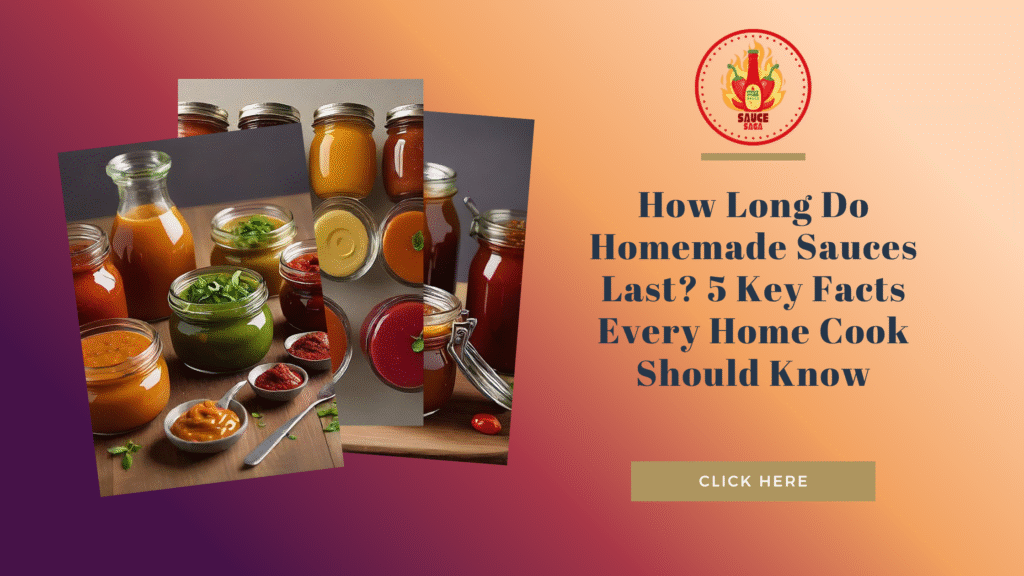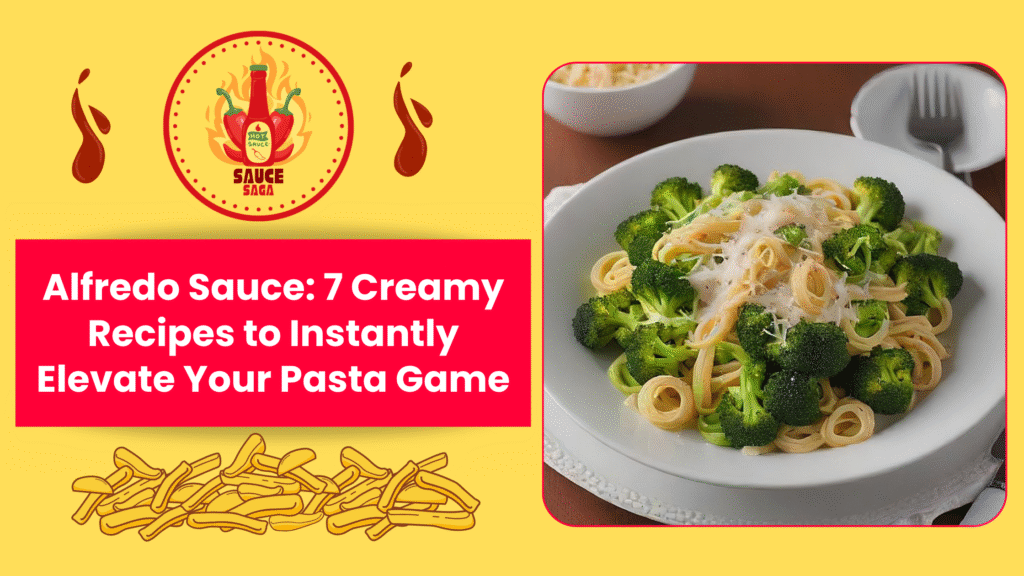Table of Contents
Introduction: Why You Should Care About Sauce Shelf Life
Homemade sauces are at least fresher, healthier, and tastier compared to those in stores. But they are unstabilized and lack preservatives, or massive loads of preservatives are added to sauces sold commercially to render them shelf-stable. This means that the homemade sauces may go bad easily, especially when not stored appropriately.
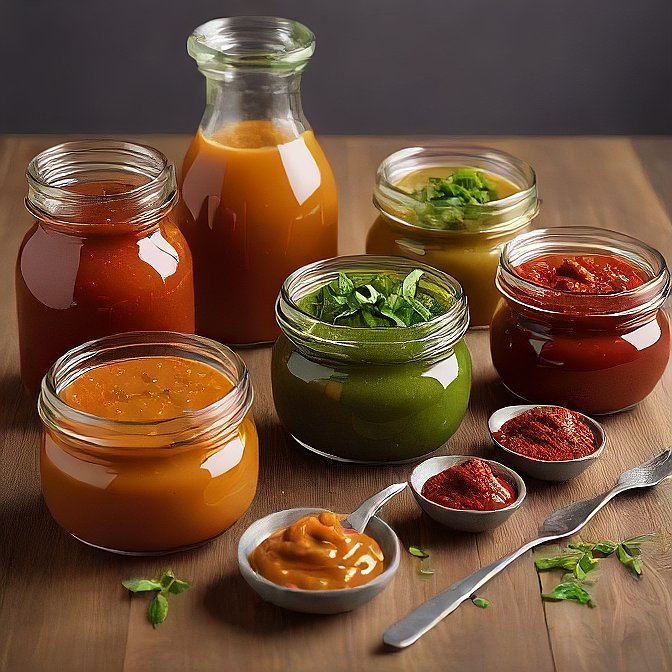
The knowledge of the lifespan of any kind of sauce and how to increase its lifespan can substantially reduce the number of wasted dishes and keep your food secure. Are you preparing tomato-based sauce to serve with your pasta or a creamy béchamel to accompany your lasagna? These five facts will help you to get a grip on your homemade sauces.
1. Shelf Life Basics: How Long Do Different Types of Homemade Sauces Last?
Not every sauce is the same. Their constituents, pH, and water content are relevant in determining their shelf life. The following is an overview of the common shelf life of refrigerators and the fastest sauces that tend to be made at home:
Tomato-Based Sauces
- Shelf life- 5-7 days
- Marinara, pizza sauce, bolognese
Tomato sauces made out of olive oil and vinegar may last between one to a few weeks, depending on the level of acidity. Meat or dairy products are to be consumed within 3 to 4 days.
Cream-Based Sauces
- Life on the shelf: 3-5 days
- Examples: Alfredo, bchamel, cheese sauce
The dairy sauces are highly perishable, and hence they should be eaten quite soon. Cream, butter, or cheese increases the rate of spoilage.
Herb and Oil-Based Sauces
- Shelf life: 5-10 days
- Exriev lengthy examples: pesto, chimichurri, salsa verde
Oil content helps these sauces to last a little bit longer, but fresh herbs may brown or go bad quite fast. Freshness can be prolonged when a thin film of oil is applied to the surface.
Vinegar or Acid-Based Sauces
- Best before date: 2-3 weeks
- Examples: vinaigrettes, Barbecue sauce, hot sauce
- Acidic sauces like those made with Vinegar-based or lemon juice, or citrus-based are long-lasting.
These are less subjected to the growth of bacteria.
Fruit-Based and Sweet Sauces
- shelf life: 7-10 days
- Examples: fruit mango puree, fruit caramel, caramel little berry.
Sugar is also a very mild preservative, although the fruit-based sauces would still be spoiled after a week. Can be stored in the fridge, in airtight jars.
Key Tip: Although in the recommended time, one should always taste, smell, and even look at a sauce, since it is always fresh.
Check Out: Blueberry Sauce: 7 Irresistible Recipes to Sweeten Your Pancakes.
2. Storage Tips to Maximize Freshness and Flavor
The way you store your sauces has of great impact on their shelf life. The freshest sauce will spoil very fast when not preserved properly.
- Use Airtight Containers
- The best glass jars or BPA-free plastic containers with lids that fit tightly. Do not use containers that have loose lids or distorted lids, which permit the entrance of air and bacteria.
- Cool Before Refrigerating
- Do not put the hot sauces directly in the fridge. They should be cooled down to room temperature. Putting hot pots into the fridge may increase internal temperatures and create a problem with other goods.
- Label Everything
- Certainly, make sure to mark dates on containers when the sauce was prepared. This helps to keep a record of the duration of storage and minimizes the possibility of using spoiled sauces.
- Store on Middle Shelves
- The interior of the fridge is maintained constant temperature. Sauces should not be placed in a fridge door, which is too cold, because the temperature swings a lot.
- Stir Before Use
- When stored, certain sauces, such as sauces flavoured with oil, might separate (usually when oil floats to the surface). The stirring returns texture and enables an individual to observe every foodstuff as to whether there is any spoilage.
3. Freezing Homemade Sauces: What Works and What Doesn’t
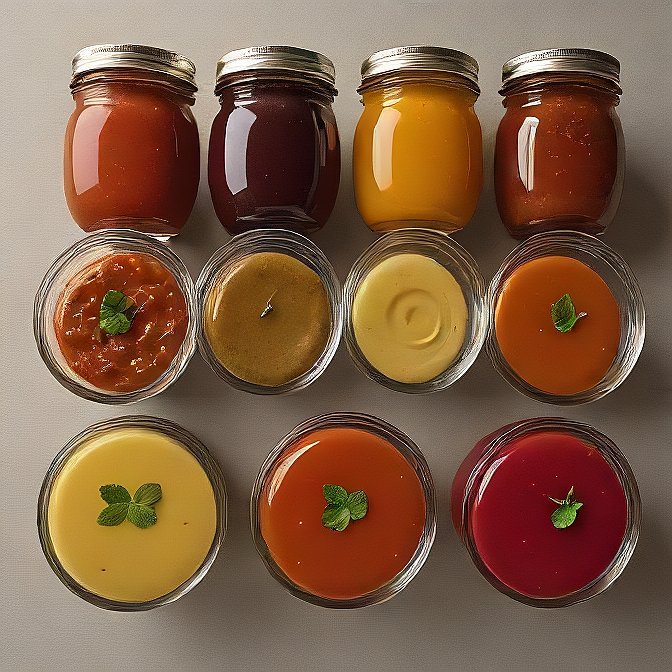
Freezing is one of the most appropriate methods of increasing the shelf life of homemade sauces. Nevertheless, not all of the sauces freeze; some of them should be prepared in a particular way prior to freezing.
Sauces That Freeze Well
- Tomato sauces (up to 3 months)
- Sauces made out of fruit, such as apple compote, mango puree (23 months).
- BBQ sauce and chili (2-3 months)
- Oil sauces (change of texture to some extent)
Sauces That Do Not Freeze Well
- Sauces that should not be frozen, Sauces that do not freeze well
- Cream containing sauces such as Alfredo or cheese sauce may break when defrosted
- Breakable emulsified sauces include hollandaise or mayonnaise types of sauce
How to Freeze Sauces Properly
- Wait to allow the sauce to cool.
- Freeze- or airtight containerize.
- Make space to grow.
- Indicate the name and the date.
- Flat freeze to make it easy to stack and to thaw more quickly.
Thawing Tips
- Be sure to thaw in the refrigerator (not on the counter).
- Warm up slowly over the low flame and keep stirring.
- In cream sauces, take into consideration re-blending with a splash of cream to get texture back.
4. Signs Your Sauce Has Gone Bad (And What to Do)
Sauces may go bad before the recommended expiration dates when they are mishandled, when the temperature changes, or when they are contaminated. Here is what to learn about the red flags of spoilage: so you can keep your dishes, and your health as well.
Visual Signs
- Fuzzy or mouldy spots
- Strange discoloration (greens or gray, in particular)
- Separation of oil, which does not re-mix after stirring
Smell Indicators
- Stinky, rancid, or off-smelling Smell
- Carpeting ammonia smells or odorous fumes
Texture Changes
- Lumpy or slushy, or too watery food texture
- A strange bubbly-ness or noticing gassiness (a symptom of fermentation)
What to Do If the Sauce Seems Spoiled
- Do not valley-test bad sauce
- Discard immediately
- Wash the container completely or get rid of it in case mould exists
Tip for Prevention
- Do not re-dip dirty utensils in the sauce container
- Do not leave the sauces out of refrigeration for temperatures than 2 hours.
5. Preserving Sauces for Long-Term Use: Canning and Vinegar Methods
One of the best ways to preserve out of this size of sauce (water bath canning or pickling) can greatly increase its shelf life, should you regularly make many portions of the sauce as a whole. This assists particularly in tomato, chili, or fruit sauce.
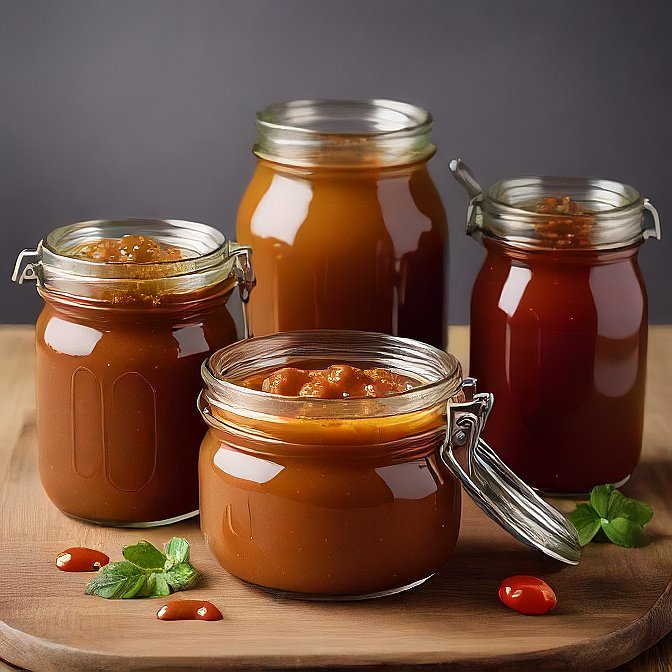
Water Bath Canning
Best for: tomato sauces, fruit chutneys, vinegar-based BBQ sauce
Process:
- Jar and lid sterilize
- Pour hot sauces into the jars, leaving headspace
- Boil in a water bath for a specific time and Seal
- Refrigerate and store cold in a dark place
Shelf life:1 year in a proper can and well sealed
Adding Vinegar or Lemon Juice
The addition of vinegar or citrus cuts down pH and does not allow bacteria to grow. It is a usual product in the form of hot sauces, salad dressing, and fruit preserves.
- Refrigerated shelf life: 2 – 3weeks
- Canned: shelf life of up to 6 12 months
Considerations:
- Use canning-tested recipes to prevent danger
- Whenever eating, ensure that you check seal integrity
- Store opened canned sauces in a fridge
Conclusion: Keep Your Homemade Sauces Safe, Delicious, and Long-Lasting
There is no other institution that might dispute the fact that homemade sauces are one of the most satisfying types of food that bring freshness, depth, and personal touch to this food. They, however, must be used sparingly so as not to waste them and to protect your health. This knowledge enables you to be assured as to whether to prepare, take, or reuse the sauces by knowing their shelf life, how they should be stored, and the symptoms to look out for.
The recap of the key facts that every home cook should keep in mind is as follows:
- The shelf life also depends on the ingredients and type. Be informed about what is in your sauce
- Correct storage retains freshness- keep airtight containers and never keep your fridge warm
- Freezing also freezes well in many sauces-portion and label to produce the best effect
- Mold, funny smells, and a change of texture are symptoms of spoilage, and it is not worth it
- Canning and using vinegar-based recipes will be long-term solutions.
These specifications will not only make your homemade sauces much better, but also last longer. Whenever you go to prepare a large amount of pasta sauce, chutney, or dressing, you will know how to store it and the time to use it.
For more info: Click Here.
FAQs
1. Can homemade sauce be left overnight, so long as it is hot?
No, sauce must not be left on the counter for over two hours (one hour on the warm), since it could allow bacteria to grow despite the fact that the sauce will still be warm. It is always preferable to cool it as quickly as possible, after which it should be put in the fridge.
2. When is it possible to determine that my frozen sauce is okay?
Frozen sauces are usually safe when frozen at 0°F or lower and preserved in air-tight containers. Check for possible freezer burn (such as the dry areas or ice crystals), which, though, may not make food unsafe, but it can change the texture. Before use, thaw, smell, and inspect before use.
3. Is it possible to use over sauce served at the table?
It is not advisable. A sauce that has touched utensils, saliva, and food on a serving plate can become compromised. Using a separate portion of the sauce is the best remedy for preventing cross-contamination in case you anticipate leftovers.

